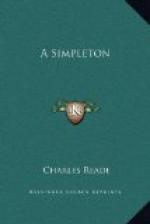The ships going out of port were such a steppingstone to him, and a vague consciousness came back to him of having been in a ship.
Unfortunately, along with this reminiscence came a desire to go in one again; and this sowed discontent in his mind, and the more that mind enlarged, the more he began to dislike the hospital and its confinement. The feeling grew, and bade fair to disqualify him for his humble office. The authorities could not fail to hear of this, and they had a little discussion about parting with him; but they hesitated to turn him adrift, and they still doubted the propriety of trusting him with money and jewels.
While matters were in this state a remarkable event occurred. He drew a sick patient down to the quay one morning, and watched the business of the port with the keenest interest. A ship at anchor was unloading, and a great heavy boat was sticking to her side like a black leech. Presently this boat came away, and moved sluggishly towards the shore, rather by help of the tide than of the two men who went through the form of propelling her with two monstrous sweeps, while a third steered her. She contained English goods: agricultural implements, some cases, four horses, and a buxom young woman with a thorough English face. The woman seemed a little excited, and as she neared the landing-place, she called out in jocund tones to a young man on the shore, “It is all right, Dick; they are beauties,” and she patted the beasts as people do who are fond of them.
She stepped lightly ashore, and then came the slower work of landing her imports. She bustled about, like a hen over her brood, and wasn’t always talking, but put in her word every now and then, never crossly, and always to the point.
Staines listened to her, and examined her with a sort of puzzled look; but she took no notice of him; her whole soul was in the cattle.
They got the things on board well enough; but the horses were frightened at the gangway, and jibbed. Then a man was for driving them, and poked one of them in the quarter; he snorted and reared directly.
“Man alive!” cried the young woman, “that is not the way. They are docile enough, but frightened. Encourage ’em, and let ’em look at it. Give ’em time. More haste less speed, with timorous cattle.”
“That is a very pleasant voice,” said poor Staines, rather more dictatorially than became the present state of his intellect. He added softly, “a true woman’s voice;” then gloomily, “a voice of the past—the dark, dark past.”
At this speech intruding itself upon the short sentences of business, there was a roar of laughter, and Phoebe Falcon turned sharply round to look at the speaker. She stared at him; she cried “Oh!” and clasped her hands, and colored all over. “Why, sure,” said she, “I can’t be mistook. Those eyes—’tis you, doctor, isn’t it?”
“Doctor?” said Staines, with a puzzled look. “Yes; I think they called me doctor once. I’m an attendant in the hospital now.”




